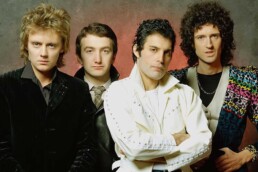Freddie Mercury, born Farrokh Bulsara on September 5, 1946, in Zanzibar, set out on a path that would take him from the bustling shores of East Africa to the peak of rock success. His early years were a complex mix of cultural influences, influenced by his Indian origin and British upbringing. Mercury’s formative years were defined by a deep affinity to music, since he was raised in the colourful traditions of his home Zanzibar before moving to England. This phase was critical in honing his skills and creating a passion that would eventually fascinate audiences all over the world.
Queen formed at the start of the 1970s, a band that would go on to reshape the landscape of rock music forever. Mercury, combined with the strong abilities of Brian May, Roger Taylor, and John Deacon, formed a creative and energetic group. Their partnership signalled the start of a revolutionary era in rock, distinguished by an unprecedented fusion of musical influences and theatrical flair. Queen’s distinct musical style, characterised by an eclectic blend of genres and a predilection for dramatic performances, established a new industry standard and caught the imagination of fans all over the world.
Mercury’s career was defined by his exceptional singing skills. His voice, known for its incredible range and emotional depth, became the foundation of his performances. With a vocal range of four octaves, he could transmit great emotion and strength in every note, distinguishing him from his contemporaries. His live performances were a display of fire and charisma, making each concert a unique experience. This powerful stage presence, combined with his distinct vocal powers, not only elevated Queen’s live shows but also reimagined the possibilities of rock performance.
Queen’s discography reflects their inventive attitude. The publication of “Bohemian Rhapsody” in 1975 was a watershed moment in music history, demonstrating the band’s ability to combine operatic elements with rock in a completely new way. This revolutionary music, with its complicated structure and genre-defying composition, attracted both audiences and critics. Anthems like “We Are the Champions” and “Somebody to Love” demonstrated their ability to combine many musical styles into cohesive, influential pieces. The band’s eagerness to experiment and push musical limits influenced the evolution of rock music.
Mercury’s influence went well beyond his musical triumphs. His candour about his personal life and position in the larger cultural environment was noteworthy in an era when such subjects were rarely discussed publicly. His presence and demeanour contributed to a larger conversation about identity and acceptance, pushing societal standards and opening the path for increased visibility and understanding in the entertainment business. This advocacy, combined with his great talent, highlighted his status as a forerunner in both music and cultural discourse.
Freddie Mercury’s legacy lingers long after his death in 1991. His music continues to captivate listeners of all ages, demonstrating the everlasting nature of his genius. The global success of the 2018 biopic “Bohemian Rhapsody” rekindled interest in his life and career, bringing his tale to a new generation and reinforcing his influence in the music industry. The continuous popularity of Queen’s songs, as well as the numerous tributes to his memory, demonstrate his career’s long-lasting effect.
Freddie Mercury’s impact on modern music and culture is still felt strongly today. His original approach to rock, stunning concerts, and distinctive personal story have left an indelible impression on the world. As his music continues to inspire and entertain, Mercury’s legacy exemplifies the enduring power of creativity and the enormous impact of a true creative visionary. Through his efforts, he has solidified his status as one of the most famous individuals in rock music history, and his tale continues to captivate and inspire fans across the world.



